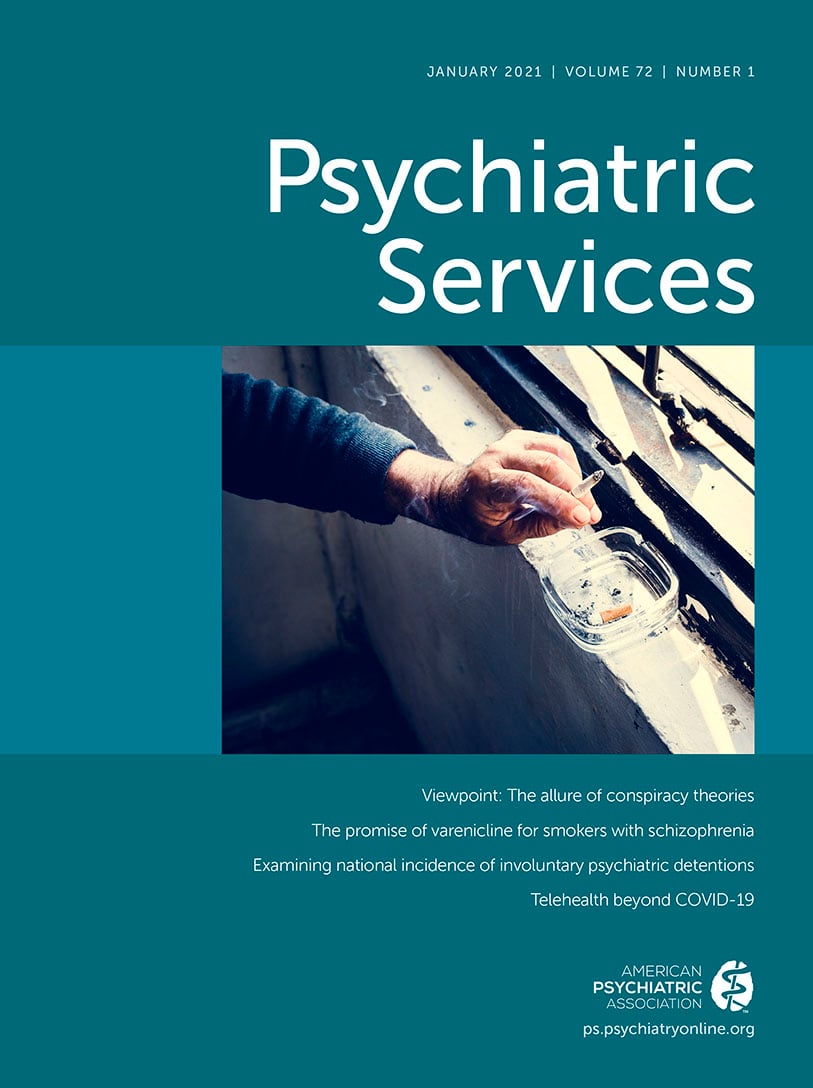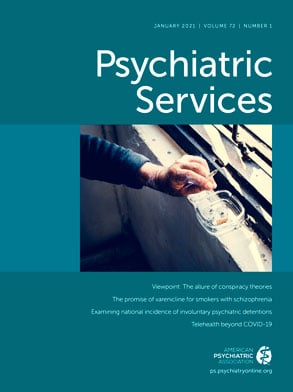An ongoing global mental health crisis has been exacerbated by the COVID-19 pandemic, which is anticipated to increase anxiety, depression, substance abuse, loneliness, and domestic violence (
1). Accordingly, the need to transform the accessibility, efficiency, and quality of mental health care is urgent. As systems rapidly convert to delivering telepsychiatry services during the COVID-19 pandemic, organizations that deliver mental health care find themselves needing to change the delivery mode of these services while ensuring their quality and safety (
2). These changes are occurring within the context of policies that remove structural barriers to mental health care. For example, clinicians across disciplines (e.g., social work and psychology) can now work across state lines, federal approval processes have been streamlined, and virtual care is now reimbursable for a range of mental health services. These changes present opportunities to innovate and improve patient-centered care. For instance, perspectives of stakeholders, along with passively collected data, can be used to glean meaningful insights relevant for changes in practice and delivery. If the right infrastructure for organizational learning is in place, efficient and systematic improvements can occur even in rapidly changing environments. In this Open Forum, we argue that to transform mental health care and to nimbly adapt to evolving challenges, consumers, clinicians, and organizations should be empowered to provide both global and local real-time information about care processes that can be used to adjust and improve care. We propose that future efforts to transform mental health care must foster the implementation of learning mental health organizations and systems (hereafter referred to as learning organizations).
What Is a Learning Organization?
Learning organizations collect data, interpret them, and feed the information obtained back into their own system to continuously improve their processes. Drawing on the recent work of the National Academy of Medicine (
3) and the Agency for Healthcare Research and Quality (
https://www.ahrq.gov/learning-health-systems/about.html), learning organizations can “continuously, routinely, and efficiently study and improve themselves” (
4). Key features of these organizations are that every patient’s data are available immediately for analysis to support health care decisions. Moreover, these organizations continuously improve processes and provide an infrastructure that involves stakeholders and enables routine and automatic data collection (
4).
To date, mental health consortia such as the Mental Health Research Network (
5) and National Network of Depression Centers have implemented concepts from the learning organization literature (
6). These efforts represent collaborations between large health systems that involve standardized protocols in key initiatives such as suicide prevention and measurement-based care. These are excellent examples of how organizations can come together within a practice-based research network to learn from one another. However, limited empirical information is available about the mechanisms through which learning organizations function. For optimal results, learning and system improvement should ripple through all levels of the organization. Efforts to this end in mental health care have largely leveraged electronic health records (EHRs) and other local data to inform broad improvement initiatives or smaller continuous quality improvement (CQI) efforts. For example, CQI has been used to improve consumer access and engagement by reducing wait times (
7). However, this approach is best suited to improving organizational care processes (i.e., at the macro level) rather than to supporting individual clinician change. Particularly when the change requires engagement and behavior change at the level of the clinician, it is likely that this approach alone will be insufficient for transforming care. In contrast, measurement-based care (MBC) may yield quality improvements at the micro level, as it more directly involves the clinician and patient in processes that use clinical data to change procedures (
8). MBC allows individual clinicians to track progress in the therapy process and to use that information to decide what changes need to be made for improving the process. However, although complementary and sharing a common goal of using data to inform improvement (
8), CQI and MBC are rarely used together.
We propose that the key mechanism of a learning organization is true alignment and empowerment of stakeholders at both the organizational and clinician levels to continuously use the most relevant data at each level—including feedback from consumers—to engender clinical practice and organizational change (see figure in the
online supplement) (
9).
Key Components of Learning Organizations in Mental Health Care
The concept of learning organizations is largely aspirational in mental health care. Further research that investigates how to implement learning organizations is needed to transform mental health care globally. Below, we operationalize key building blocks of a learning organization in mental health care by using the example of telepsychiatry care, given its relevance in light of the physical distancing required to minimize the spread of COVID-19.
The role of consumers.
Consumers of mental health services have few opportunities to provide systematic feedback to the organization that serves them. Organizations that integrate consumers’ feedback about system processes and therapeutic progress will foster innovation and move mental health care toward patient-centered approaches. Consumer needs must be the primary drivers of systemic change, and methods that effectively solicit patient input must be empirically derived (
10). For example, the deployment of telepsychiatry services, consumer feedback on technology satisfaction, and the methods for sending support materials and psychotherapy tools can all ensure that care remains accessible and satisfactory.
The role of clinicians.
Engaging and empowering clinicians to solve problems in order to optimize care processes and to change practices in response to clinical data are key components. Leaders in a fully aligned learning organization support clinicians in continuing to deliver MBC via telepsychiatry, and standard assessment scales are used to determine care effectiveness. When key outcomes do not improve, some clinicians may review their data and use them to discuss the therapeutic alliance or session attendance, and others might decide to focus on adopting an evidence-based practice. Without institutional support and stakeholder input, MBC could easily fall by the wayside because of the challenges in completion by consumers and transmission of their assessments to clinicians.
The role of organizational leadership.
The learning organization framework proposed by Garvin and colleagues (
11) highlights organizational factors, such as leadership, that reinforce learning and environmental factors, such as psychological safety (i.e., an environment where it is safe to articulate and acknowledge challenges) (
12), as being instrumental for establishing a successful learning organization. Leaders may either create a climate and culture of psychological safety and learning from feedback or inadvertently demoralize and create resistance to change among clinical staff. Clinicians need leaders who create a psychologically safe context that enables clinicians to reflect on clinical data to improve care and outcomes and to make data-informed changes to their practice. For example, in telepsychiatry, it is necessary for clinicians to feel that it is safe to reflect on barriers they experience and to brainstorm effectively and creatively to remove these barriers. They will also require support in navigating rapidly changing policies and meeting expectations regarding telepsychiatry.
Use of technology to obtain data rapidly and at scale.
Rapid data extraction from various sources, including EHRs, can yield actionable real-time information. To this end, systems such as the EHR that were originally engineered mainly for billing purposes need to be retooled to facilitate rapid extraction and interpretation of data that can inform care decisions. Importantly, systems can synthesize meaningful and actionable data that are then available to stakeholders. From the start, all stakeholders must be at the table to discuss and decide what data are meaningful, and individuals with skills in interpreting the data within a specific system are needed. For example, daily extraction of data on scheduled and kept sessions, technical difficulties, and patient-reported outcomes, along with other important metrics, could inform necessary changes to increase access, engagement, and quality during rapid shifts to telepsychiatry care.
Enhancing deployment of a learning organization with insights from other fields.
Clinicians must be treated as equal partners in efforts to optimize outcomes, and recognition of their efforts and contributions is essential (
13). Clinicians can ensure that solutions are well integrated into an existing workflow. Incentives and rewards are potent levers that leaders can deploy to empower, motivate, and support clinicians to optimize the care they provide and to recognize their efforts. A systematic review has found that financial incentives may be effective in changing professional practice in health care, particularly in improving care processes (
14). Results from an alternative strategy, social incentives, suggest that motivation can be influenced by a desire to uphold the professional standards of those who enter the health care profession. Such incentives and rewards can be deployed to motivate individual change (
15)—for example, with regard to clinician motivation to use MBC during the shift to telepsychiatry. Questions of how care systems can promote and spread financial and social incentives are important to consider within this research agenda; it is critical that they be included in the design and deployment of these approaches from the beginning.
Conclusions
In these unprecedented times, as-we-go learning and rapid adaptation to new practice procedures are needed to face the challenges of the current health crisis. One response to the COVID-19 pandemic has been the rapid implementation of telepsychiatry care, in which the principles and practices of learning organizations are more important than ever. Moving beyond aspirational goals and toward functioning learning organizations in mental health care will require both the technological capacity and the ability of organizational leaders to spark clinician motivation, reflection, and innovation. This move requires a psychologically safe environment that encourages reflection, motivates individuals and teams to quickly learn from data, and uses incentives and rewards effectively. These steps can inspire and celebrate the contributions of clinicians and leaders at all organizational levels to better serve our patients when they need the very best we can offer.

